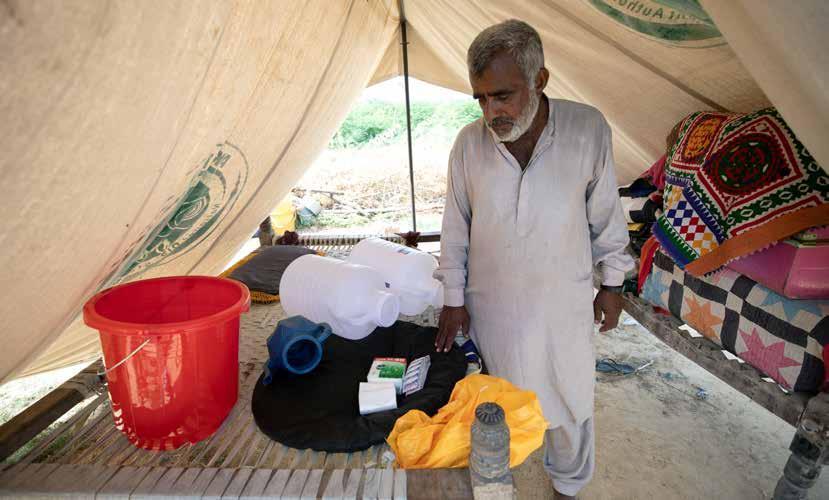
1 minute read
HOW WE HELPED: WATER, SANITATION AND HYGIENE MUHAMMAD
Many of rural populations in Pakistan were facing an acute shortage of safe drinking water even before the floods, as communities relied on groundwater which was unsafe and salty in taste. The lack of safe water sources was further exacerbated by the floods after handpumps were destroyed or damaged.
In collaboration with local authorities, DEC member charities have been repairing water points in rural locations where access to safe water is limited. DEC member charities have also helped to revive the establishment of locally led water and sanitation user committees, which will manage and maintain the water points long term.
Moreover, hygiene promoters were deployed and supported hardto-reach areas, engaging women and children through hygiene awareness sessions which were conducted in communities on topics covering nutrition, health, hygiene, use of clean and safe drinking water and its importance for overall wellbeing. Sessions were delivered in local languages and designed to be engaging and easy to understand. Following these sessions, participants reported that they went to nearby villages to share what they had learned in order to help promote and improve hygiene practices for more people.
To improve hygiene and sanitation, families were provided with hygiene kits containing soap, detergent, toothbrushes and toothpaste, towels, sanitary pads, and a plastic jerrycan to collect water. Mosquito nets were also provided and fumigation sprays were undertaken in some villages.
Muhammad’s house in Sindh province was completely submerged by the floods and he and his family had to live in the open under a tent canvas. A local partner of a DEC member charity supported them from early in the crisis, including with food. “When I came here I didn’t have anything, but [the local partner] gave me rations and supported us,” said Muhammad in September 2022.
With the support of a DEC member charity, the local partner was now distributing hygiene kits including a bucket, jerry cans, water purification tablets, soap, mosquito nets and other items.
“Because our water was not clean, a child died from a diarrhoeabased disease,” said an aid worker for the local partner. “In the hygiene kit, they were given Dettol Soap with which they can wash their hands. Mosquito nets have been given to prevent malaria, and a water tablet was given with which they could purify the water. All these things have made a big difference and reduced diseases.”
108,000 people provided with access to safe water
25,100 households received hygiene kits

21,100 people participated in hygiene sessions
5,000 mosquito nets were distributed 60 villages fumigated for mosquitoes










